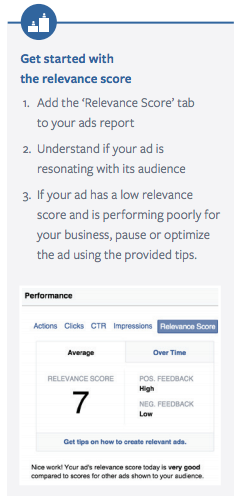We do a good deal of Facebook Advertising around here, so when Facebook released information about its new Relevance Score measure, we thought it helpful to break this down.
The main advantage of managing and increasing your Relevance Score is to achieve lower cost per click and more efficient delivery for your Facebook Ads.
What is Facebook’s Relevance Score?
In a nutshell, it’s a measure of how relevant your ad is to the people you’re targeting.
Google has had a metric like this for many years. They call it Quality Score, a 1 to 10 scale indicating how good of a search result your ad makes for a given keyword. Advertisers with high scores are rewarded with a lower cost per click, while those with low scores suffer from poor impression share and pay more to reach the same users.
At first glance, the Relevance Score introduced by Facebook promises to do some of the same things.
When your ad is shown to your target audience on Facebook, they have a few options:
1. Respond positively: like it, share it or convert.
2. Respond negatively: hide or report your ad
3. Do nothing.
The more people respond positively to your ad, the better your Relevance Score. The more negative feedback you get, the worse you’re scored. Before your ad is live and has real feedback to rely on, Facebook will make guesses about people’s behavior and assign a starting score.
Where do I see my Facebook Relevance Score?
You can now add Relevance Score as a column to reports. It looks like this.

How do I improve Facebook Relevance Score?
There are a number of factors that contribute to your score. Overall, if your ads resonate nicely with your target audience, and especially if they convert well, you’ll have no issues with Relevance Score.
If you need to troubleshoot a low score, here are some good places to start:
1. Tighten your targeting. Try some niche segments with respect to interests, in-market categories, etc. If you achieve a better score by doing this, slowly fan out your targeting from there — or better yet, create dedicated campaigns for each market segment, each with tailored ads and images.
2. Focus on the image. Your prospects will see the image associated with your Facebook Ad before they read the text, so A/B test images rigorously until you find one that resonates. Be careful with risqué photos, though. While they might score a few curious glances at first, inappropriate content is more likely to get your Relevance Score in trouble.
3. Keep your ads fresh. Every ad has an expiration date, especially on Facebook where each user is viewing so many pages daily. Continually cycle your ads and keep it interesting. Fresh engagement from users will help your Relevance Score.
Got other ideas for how to boost Relevance Score? Tell us in the comments.
